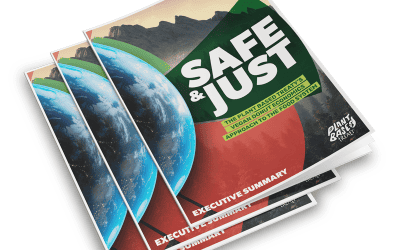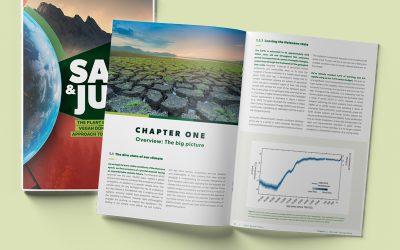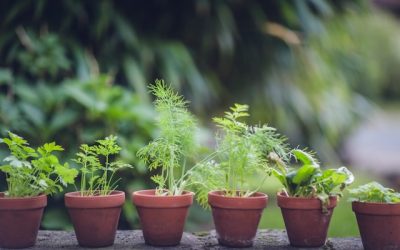Blog
Earth Day has come and gone but we can protect our planet all year long. The Earth Day theme for 2022 was Invest in our Planet and there has never been a more crucial time to do this to save our beautiful earth for future generations. The most important thing we can do right now is end all animal agriculture because it is one of the biggest threats to our planet. Not to mention factory farming exploits animals, so adopting a plant-based diet is also the kindest thing you can do for them and the best thing for your own health. In addition to not eating meat, fish, dairy, or eggs there are other important things we can do to protect our planet. Here are a few to get you started.

1. Eliminate meat and fish – eat more plants!

The more meat and fish people consume the more negative impact on the climate. Animal farming is the main cause of deforestation, species extinction, and ocean dead zones. Animals such as cows, pigs, and chickens raised by humans to be killed for food are largely responsible for the climate crisis we face today. There is a methane emergency and we need to make big changes to end animal farming as it’s the leading cause of greenhouse gas emissions. These farmed animals emit toxic levels of methane gas, CO2, and excrement that pollutes our air and water. The more meat people consume the more negative impact on the climate. Eating plants is better for the planet, the animals and our health.
Fish are also farmed and die horrible deaths on aquafarms. About half of all fish consumed around the world are raised on land or ocean-based aquafarms. As reported by Animal Equality, a two-acre fish farm produces as much waste as a city of 10,000 people. Other ways fish are killed for food is industrial fishing and bottom trawling, a term used when massive fishing nets are dragged along the ocean floor extinguishing everything in their path. Approximately 95% of global ocean damage is from bottom trawling and oceans and waterways are being polluted by these large-scale fishing operations.
Seaspiracy trailer. The full movie is available to watch on Netflix
“Bycatch” creatures (the invisible victims) such as whales, seals, dolphins, sharks, sea turtles, octopuses, seals, and birds also get caught in nets of commercial fishing operations. To learn more about the fishing industry watch Seaspiracy.
Sign up for Meatless Mondays or PETA’s 3-Week vegan challenge to start your journey towards a healthy-plant based diet.
2. Ditch dairy products
Dairy farms are terrible for our planet. Cows on dairy farms produce an enormous amount of manure daily that ends up in drinking water and waterways and is a huge cause of polluted lakes and rivers. Manure from dairy cows produces greenhouse gas emissions contributing directly to climate change. Studies suggest that gas from dairy cows on farms produces more harmful gasses, smog, and pollution than driving cars. Despite what the dairy industry falsely leads us to believe, the production of milk negatively impacts our planet. Did you know that just one dairy cow drinks up to 150 liters of water a day? In hot weather that number jumps to 200 liters. Yikes!

Switching dairy for plant-based milk, cheese and ice cream prevents more methane from accumulating in the atmosphere. Not to mention the dairy industry is the cruelest in the world. Male calves are stolen from their mothers and killed as babies shortly after their birth; cows have much shorter life spans in captivity and mother cows are eventually slaughtered for their meat in violent ways when their tired bodies can no longer produce milk.
3. Stop eating eggs

Eating eggs from factory farms contributes to environmental pollution. This is explained in more detail by Food Print, a foundation raising awareness on critical environmental and public health issues of the industrial food system.
“…Egg facilities produce more manure than the surrounding land can typically absorb. There are many environmental and community consequences resulting from excessive animal waste: Manure that seeps into groundwater or runs off into surface water carries excess nitrogen and phosphorous, which can contaminate drinking water or cause algal blooms and die-offs of aquatic species.” – Food Print
Food Print continues to explain that high levels of ammonia and other air pollutants from egg farms impact the earth and people living in nearby communities.
“…gasses are blown out of the hen houses with industrial fans, along with litter dust and dried fecal matter, which may contain salmonella or other harmful bacteria, increasing risk of infection. – Food Print
Chickens are some of the most abused animals on the planet. They live a life in complete misery on factory farms and deprived of everything natural to them such as stretching their wings, grazing, scratching for food, taking dust baths, lying in the sun, and being social with other chickens. To read more about the exploitation of chickens on farms read The Truth About The Egg Industry.
4. Reduce plastic consumption

To help our planet’s oceans, rivers, streams, parks, and the animals living here, (including humans!), we need to avoid using single-use plastics as much as possible (with exceptions for medical reasons). Avoid plastic straws, cutlery, plates, and cups. Many zero waste restaurants have banned plastic and large international hotel brands such as Iberostar have become the first hotel chain in the world to be plastic-free since 2020. This proves it is possible to reduce our plastic consumption. Yet other restaurants continue to offer single use plastic items and dollar stores continue to sell them for very cheap. But the real price of plastic is what it costs the earth. Plastic items become microplastics and degrade into very small pieces ending up in the air we breathe and our waterways.
“Plastic is the most prevalent type of marine debris found in our ocean and Great Lakes. Plastic debris can come in all shapes and sizes, but those that are less than five millimeters in length (or about the size of a sesame seed) are called “microplastics.” – National Ocean Service
Luckily there are alternatives! Politely ask your friends and family to use utensils made of reusable or recyclable materials like stainless steel, glass, bamboo, wood. Straws can be made from 100% biodegradable items like corn, coconut, and agave. Skip buying more plastic storage containers and invest in sustainable alternatives. Plastic toothbrushes are a big problem too. A billion plastic toothbrushes are thrown away in the United States annually. This hurts marine life and oceans, but luckily alternatives such as bamboo are becoming more available. Despite some cities banning plastic bags or charging a fee for them, they are still a problem.
“In Canada, up to 15 billion plastic bags are used every year and close to 57 million straws are used daily. In addition, single-use plastics make up most of plastic litter that is found in freshwater environments.” – Government of Canada
The Government of Canada, although behind their original schedule, is set to ban six harmful single use plastic items in 2022. In the meantime, Canadians can reduce plastic consumption on their own and people living in other parts of the world can approach their governments and suggest similar bans happen where they live.
5. Grow your own veggies and plant trees

With summer weather upon us it’s the perfect time to grow vegetables, herbs and flowers in our backyard, community garden, or balcony. Planting, growing, and harvesting sustainable organic produce reduces carbon emissions and manages soil with compost for years to come. Your carbon emissions will be zero if you grow your own food because you can do it without pesticides and your food will not have to travel across the world.
Volunteering to plant trees with an organization is a great way to get involved in the community. Trees draw out carbon dioxide from the atmosphere and cleans the air by removing various pollutants.
“Planting billions of trees across the world is one of the biggest and cheapest ways of taking CO2 out of the atmosphere to tackle the climate crisis, according to scientists, who have made the first calculation of how many more trees could be planted without encroaching on crop land or urban areas.”
“As trees grow, they absorb and store the carbon dioxide emissions that are driving global heating. New research estimates that a worldwide planting programme could remove just under one-third of all the emissions from human activities that remain in the atmosphere today, a figure the scientists describe as “mind-blowing” – The Guardian
As a third option, consider creating a beautiful flower garden. Flowers attract bees and other pollinators that are vital to our earth and play a crucial role helping our planet thrive long after Earth Day has ended.
How you can help
1. Download your free vegan starter kit to get started with a plant-based diet
2. Sign the Plant Based Treaty. Your signature will help put pressure on national governments to negotiate an international Plant Based Treaty as a companion to the UNFCCC/Paris Agreement. The treaty calls for system changes such as an end to the expansion of animal agriculture, the redirection of subsidies and public information campaigns, and restoration and reforestation on land and sea.
3. Make a donation to help us launch and maintain impactful campaigns that demand a plant-based food system for the benefit of animals, climate, and health.

Miriam Porter is an award-winning writer who writes about veganism, social justice issues, and eco-travel. Miriam currently lives in Toronto with her son Noah and many rescued furry friends. She is a passionate animal rights activist and speaks up for those whose voices cannot be heard.
More from the blog
6 More Important Calls To Action From The Safe And Just Report – Part Two
By Miriam Porter
6 Important Calls To Action From The Safe And Just Report – Part One
By Miriam Porter
Grow Your Own Kale And Spinach For Healthy Green Smoothies
By Miriam Porter



